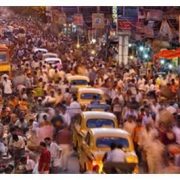The Population Boom
In their century long coverage of exotic places, cultures, and practices, National Geographic Magazine inadvertently sheds light on broad global trends that deeply affect the rest of us. Plus, the pictures are great. A recent issue celebrated the approach of the world's population to 7 billion, and the implications therein.
Long time readers of this letter know that demographic issues will be one of the most important drivers of all asset prices for the rest of our lives. The magazine expects that our planet?s population will reach 9 billion by 2045, the earliest date that I have seen so far. Can it take the strain? Early religious leaders often cast Armageddon and Revelations in terms of an exploding population exhausting all resources, leaving the living to envy the dead. They may not be far wrong.
A number of developments have postponed the final day of reckoning, including the development of antibiotics, the green revolution, DDT, and birth control pills. Since 1952, life expectancy in India has expanded from 38 years to 64. In China, it has ratcheted up from 41 years to 73. These miracles of modern science explain how our population has soared from 3 billion in a mere 40 years.
The education of the masses may be our only salvation. Leave a married woman at home, and she has eight kids, as our great grandparents did, half of which died. Educate her, and she goes out and gets a job to raise her family's standard of living, limiting her child bearing to one or two. This is known as the ?demographic transition.?
While it occurred over four generations in the developed world, it is happening today in a single generation in much of Asia and Latin America. As a result, fertility around the world is crashing. The US is hovering at just below the replacement rate of 2.1 children per family, thanks to immigration. But China has plummeted to 1.5, Europe is at 1.4, and South Korea has plunged as low as 1.15.
Population pressures are expected to lead to increasing civil strife and resource wars. Some attribute the genocide in Rwanda in 1999, which killed 800,000, as the bloody result of overpopulation.




